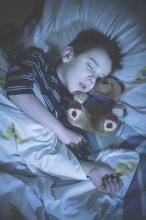Children with attention-deficit hyperactivity disorder (ADHD) take longer to fall asleep and sleep less efficiently when they are taking stimulant medications, according to a recent meta-analysis.
“In [randomized controlled trials] using objective measurements of sleep, stimulant medications led to longer sleep latency, worse sleep efficiency, and shorter sleep duration,” Katherine M. Kidwell and her associates in the department of psychology at the University of Nebraska–Lincoln reported Nov. 23 in Pediatrics. “Overall, children and adolescents had worse sleep when they took stimulant medications.”
The researchers searched CINAHL (EBSCO), PsycINFO and PubMed databases for articles through March 2015 that examined the effect on sleep of stimulants prescribed to youth for ADHD or ADD. The inclusion criteria included patients diagnosed with ADHD, randomization of stimulant drugs, sleep measured by actigraphy or polysomnography and adequate statistical information to calculate effect sizes of key sleep variables (Pediatrics 2015 Nov. 23 [doi:10.1542/peds.2015-1708]).
Nine articles met the inclusion criteria; they included a total of 246 patients with mean ages of 8-11 years old.
Seven articles, involving 171 participants, looked at the effect of stimulants on sleep latency and had a combined effect size of 0.78, indicating a longer sleep latency associated with stimulant medications. After adjustment for publication bias, the adjusted effect size was a significant 0.54 (P < .001).
Frequency of dosage per day moderated the sleep latency effect, with each additional dose per day increasing the effect size by 0.42.
“The effect of stimulant medication on sleep latency became greater when the stimulant was taken more frequently throughout the day,” Ms. Kidwell and her associates wrote.
Seven studies involving 155 participants investigated sleep efficiency in children taking stimulant medications and had a significant overall effect size of –0.39 before adjustment and –0.32 after adjustment (P < .001), indicating poorer sleep efficiency associated with stimulants.
Both study design and sample characteristics moderated the effect. Each extra day that youth took medication, the effect size became less negative by 0.05. “This finding is mostly consistent with a frequently proposed, but rarely tested, argument that youth adjust to medication over time and may have initial sleep problems that will resolve,” according to the investigators.
Polysomnography revealed poorer sleep efficiency than actigraphy did, and the effect of poorer sleep efficiency was greater for boys than for girls.
Seven studies involving 223 participants examined total sleep time. The significant effect size of –0.59 indicated an association between the stimulants and shorter total sleep time with no moderators or need for adjustment (P < .001).
“Stimulant medications impair the sleep of children and adolescents, as evidenced by findings using rigorous methods,” Ms. Kidwell and associates concluded. “It is recommended that pediatricians carefully assess for sleep problems in children with ADHD and monitor medication type and dosage schedules to promote optimal sleep and minimize medication-induced sleep impairments.”
The research did not receive external funding. The authors reported no relevant conflicts of interest.


